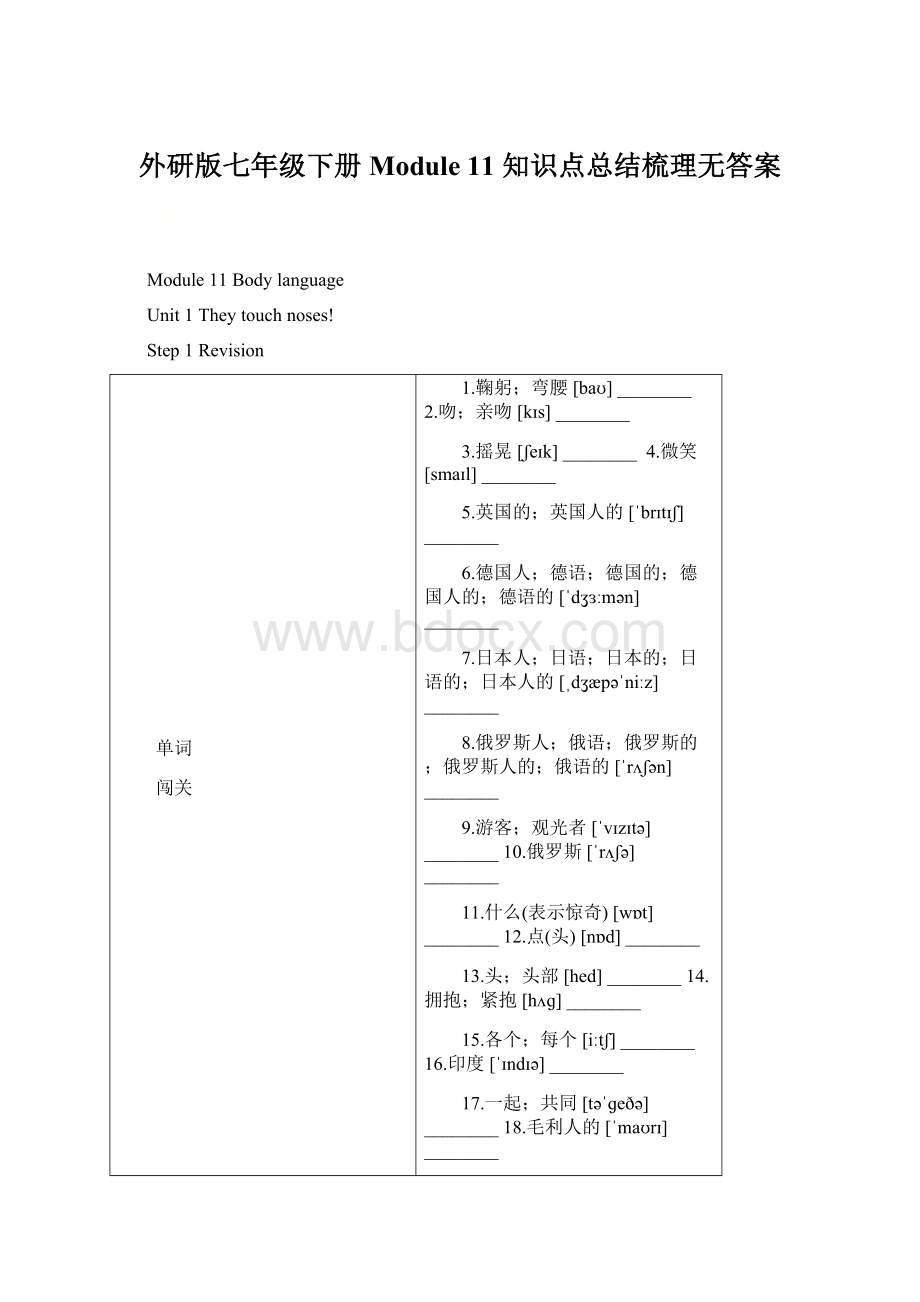外研版七年级下册Module 11 知识点总结梳理无答案.docx
《外研版七年级下册Module 11 知识点总结梳理无答案.docx》由会员分享,可在线阅读,更多相关《外研版七年级下册Module 11 知识点总结梳理无答案.docx(14页珍藏版)》请在冰豆网上搜索。

外研版七年级下册Module11知识点总结梳理无答案
Module11Bodylanguage
Unit1Theytouchnoses!
Step1Revision
单词
闯关
1.鞠躬;弯腰[baʊ]________2.吻;亲吻[kɪs]________
3.摇晃[ʃeɪk]________4.微笑[smaɪl]________
5.英国的;英国人的[ˈbrɪtɪʃ]________
6.德国人;德语;德国的;德国人的;德语的[ˈdʒɜːmən]________
7.日本人;日语;日本的;日语的;日本人的[ˌdʒæpəˈniːz]________
8.俄罗斯人;俄语;俄罗斯的;俄罗斯人的;俄语的[ˈrʌʃən]________
9.游客;观光者[ˈvɪzɪtə]________10.俄罗斯[ˈrʌʃə]________
11.什么(表示惊奇)[wɒt]________12.点(头)[nɒd]________
13.头;头部[hed]________14.拥抱;紧抱[hʌɡ]________
15.各个;每个[iːtʃ]________16.印度[ˈɪndɪə]________
17.一起;共同[təˈɡeðə]________18.毛利人的[ˈmaʊrɪ]________
19.触摸;接触[tʌtʃ]________20.鼻子[nəʊz]________
短语
互译
1.nodone'shead____________2.NewZealand____________
3.headteacher____________4.与某人握手_______________
5.三次____________6.互相;彼此____________
Lingling:
We’regoingtohavesomeRussianteachersatschooltomorrow,andI'mwelcomingthevisitors.HowdoIdothat?
Betty:
Lingling,youknow,inRussia,peopleusuallykissthreetimes,left,right,left.
Lingling:
What!
No,Ididn'tknowthat.WeChineseoftenshakehandsandsmilewhenwemeetvisitors,andsometimeswenodourheads.Butweneverkiss.Onlyparentsandchildrendothat.
Betty:
That’sbecausepeopledodifferentthingsindifferentcountries.
Lingling:
SowhatdopeopleintheUSusuallydowhentheymeet?
Betty:
IntheUSsomepeopleshakehands,andsomekissorhugeachother.InIndiapeopleputtheirhandstogetherandnodtheirheads.AnddoyouknowwhatMaoripeopleinNewZealanddowhentheymeet?
Lingling:
No.Whatdotheydo?
Betty:
Theytouchnoses!
Step2Languagepoints
1.smilen.&v.微笑
例:
Shewelcomeduswithasmile.她微笑着欢迎我们。
Thebabyissmilingatme.这个婴儿正在朝我笑。
【考点】
(1)smile作名词,意为“微笑”,常指无声的笑。
withasmile意为“面带微笑”。
若表示“一个……微笑”,中间可加入其他修饰语。
例如:
一个甜甜的微笑asweetsmile
(2)smile作动词,意为“微笑”,为不及物动词。
表示“对……微笑”时,后接at。
典例精讲:
(1)他刚才对我微笑了。
He________atmejustnow.
(2)他微笑着问候学生们。
Hesaidhellotothestudentswith________________.
2.Germann.德国人;德语adj.德国的;德国人的;德语的
例:
AretheyGermans?
他们是德国人吗?
ThetwoGermansarefromatowninGermany.这两个德国人来自德国的一个城镇。
【考点】German作形容词时,意为“德国的;德国人的;德语的”;作名词时,意为“德国人;德语”。
German作“德国人”讲时,其复数形式为Germans。
Germany为名词,意为“德国”。
【重点】
(1)表示“某国人”的名词变复数形式一般可直接加s。
例:
American→Americans(美国人);Australian→Australians(澳大利亚人);
Russian→Russians(俄罗斯人);Canadian→Canadians(加拿大人);
Austrian→Austrians(奥地利人);German→Germans(德国人)
(2)以ese结尾的表示“某国人”的名词单复数同形。
例:
Chinese(中国人),Japanese(日本人)
典例精讲:
—Areallthestudentsfrom________inyourclass?
—No,thereareonly3________inourclass.Theothersarefromothercountries.
A.Germany;GermenB.Germany;Germans
C.German;GermansD.German;Germany
3.That'sbecausepeopledodifferentthingsindifferentcountries.
那是因为不同国家的人们做法不同。
【考点】That'sbecause…意为“那是因为……”,后接表示原因的句子。
【重点】that'sbecause与that'swhy的区别:
that'sbecause
意为“那是因为……”,后接表示原因的句子。
例:
That'sbecauseIdidn'tknowaboutit.那是因为我不知道此事。
that'swhy
意为“那是为什么……”,后接表示结果的句子。
例:
That'swhyhecamelate.那就是他来晚了的原因。
典例精讲:
用that'sbecause或that'swhy填空
(1)Jimoversleptthismorning.____________hewaslateforschool.
(2)Tonywaslateforschoolthismorning.____________heoverslept.
4.shake/ʃeɪk/v.(shook)摇晃
eg:
Thetwomenshookeachotherbythehand.那两个人互相握了握手。
【考点】shake的常用搭配
shakehandswithsb.
Heshookhandswithherwarmly.他热情地与她握手。
shakeone'shead摇头
Thedoctorshookherhead.医生摇摇她的头。
典例精讲:
翻译句子
_________________________________________________.美国人经常握手或拥抱彼此。
5.different/'dɪfrənt/adj.不同的,个别的
eg:
We’redifferentfromthem.我们与他们不同。
【考点】different修饰名词,名词一般用复数;其反义词为same(相同的)。
eg:
Wehavedifferenthobbies.我们有不同的爱好。
【重点】bedifferentfrom与……不同,反义词组是bethesameas,意为“与……一样”。
eg:
Mytrousersaredifferentfromyours.=Mytrousersarenotthesameasyours.
我的裤子与你的不一样。
典例精讲:
Theyareindifferentteams.(改为同义句)(白银)
Theyaren’tin________________team.
Step3Practice
一、用方框中所给单词或短语的适当形式填空
visit,hug,German,bow,welcome,nose,Japanese,different,bodylanguage,shakehandswith
1.________________toournewhotel!
Thisway,please.
2.InJapan,peopleusually________________whentheymeeteachother.
3.Inspringtherearemany________________fromallovertheworldinthecity.
4.TheycomefromGermany,sotheyare________________.
5.Myunclecanspeaksome______________,becausehestayedinJapanforsixmonthslastyear.
6.Sometimesonlythe______________canhelpyouunderstand(理解)therealideaofotherpeople.
7.Chinesepeopleusually________________eachotherwhentheymeet.
8.Thebabyelephantlikesplayingwithwaterwithherlong________________.
9.Tomwenttomany________________citiesinChinaandhelovesChinanow.
10.Twentyyearslater,hemethisoldfriendandthey________________eachother.
二、用所给单词的适当形式填空
1.Theyaregoingtohavesome________(Russia)teachersatschool.
2.InRussia,peoplekissthree________(time)whentheymeetfriends.
3.TomisfromtheUSA,soheisan________(America).
4.Whenyouwanttoleave,pleasewave________(say)goodbyetoeveryone.
5.Thesetwo________(German)aremynewfriends.
6.Thousandsof________(visit)cometoBeijingeveryday.
三、单项填空
1.Peopleovertherearefrom________.Theyare________.
A.Russian;RussianB.Russians;Russian
C.Russia;RussiansD.Russia;Russian
2.Bobdislikescoffee,sohealmost________drinksit.
A.oftenB.alwaysC.neverD.ever
3.Theycomefrom________country,buttheyhave________hobbies(爱好).
A.different;sameB.same;thedifferent
C.thesame;differentD.different;thesame
4.Westerners(西方人)often________whentheymeet.
A.hugeachotherB.shakeshands
C.touchnosesD.touchheads
5.—________dotheJapanesepeoplesayhello________theymeet?
—Theybowtoeachother.
A.How;howB.What;whenC.Why;howD.How;when
四、完形填空
Babies'bodylanguagecantellyoualotofinformation,including(包括)__1__theyneed.Ifyoucan__2__babies'bodylanguagewell,youcantakebettercareof__3__.Hereissomeexperience(经验)ofsome__4__.
Jessica:
SometimeswhenmybabyandIplay__5__atoy,shesuddenlylooksaway.Itseemsthatsheissaying,“Hey,thetoyisreally__6__,butIthinkitisboringnow.”ThenIrespect(尊重)mybaby'sneedandletherhavea__7__.MaybeIlethergotobed,orstartanothergameoractivity.
Michelle:
Myseven�month�oldbabyoftencrieswhenIcan'tputfoodinhismouth__8__enough.Sometimesheturnshisfaceawayanddoesn't__9__me.Thatistosay,heisfull.
Learntoreadbabies'bodylanguageandrespectbabies__10__itisthebestsign(符号)oftheirneed.
1.A.howB.whatC.whereD.when
2.A.helpB.showC.knowD.touch
3.A.himB.themC.herD.us
4.A.mothersB.teachersC.doctorsD.students
5.A.withB.toC.forD.on
6.A.famousB.heavyC.smallD.interesting
7.A.bookB.restC.movieD.club
8.A.easilyB.quicklyC.easyD.quick
9.A.getoffB.waitforC.payforD.lookat
10.A.butB.orC.becauseD.after
Unit2Herearesomewaystowelcomethem.&Unit3.
Step1Review
单词
闯关
1.手指[ˈfɪŋɡə]________2.脚;足[fʊt]________
3.膝盖[niː]________4.腿[leɡ]________
5.嘴;口[maʊθ]________6.身体;躯干[ˈbɒdɪ]________
7.外国的[ˈfɒrɪn]________8.个人的[ˈpɜːsnəl]________
9.臂;手臂[ɑːm]________10.握着;使不动[həʊld]________
11.移动[muːv]________12.不列颠;英国[ˈbrɪtn]________
13.礼貌的[pəˈlaɪt]________14.某个地方[ˈsʌmweə]__________
15.挥(手);招(手);摆(手)[weɪv]________16.事实;细节[fækt]________
17.粗鲁的;无礼的[ruːd]________18.带来[brɪŋ]________
短语
互译
1.verysoon____________2.arminarm____________
3.closeto____________4.intheMiddleEast____________
5.moveaway____________6.standinline_________________
7.ontime____________8.holdonto____________
9.personalspace____________10.一点也不____________
11.北美人______________12.事实上____________
13.挥手道别________________14.当心;小心____________
15.对某人有礼貌____________16.肢体语言____________
17.独自进入实验室_______________18.为他人开门_________________
Step2Languagepoints
Bodylanguagearoundtheworld
ByWangLingling
Ournewforeignstudentsaregoingtoarriveverysoon,andherearesomewaystowelcomethem.
Howclosedoyoustandwhenyoutalktoafriend?
YoucanstandclosetopeopleintheMiddleEastbutdon’tstandtooclosetoNorthAmericans!
Givethemmorepersonalspace.
Howabouttouchingpeople?
Chinesegirlsoftenwalkarminarmwiththeirfriends.SouthAmericanssometimesholdyourarmwhentheytalktoyou,soyoucan’tmoveaway!
ButinBritainmanypeopledon’tlikeotherpeopletotouchthematall.
Doyoulookatpeoplewhenyoutalk?
Insomeplaces,itisn’tpolitetolookatpeoplewhenyoutalk,butinothercountriesitisn’tpolitetolooksomewhereelse.InBritainandtheUS,peopleusuallylookateachotherwhentheytalk.
Andhowdoyousaygoodbye?
That’seasy,wavetosaygoodbye.Butbecareful!
InGreece,it’snotatallpolite!
Infact,it’sveryrude!
1.closeadv.靠近地adj.靠近的;接近的
例:
Howclosedoyoustandwhenyoutalktoafriend?
当你和一个朋友交谈的时候,你站得多近?
【考点】close可用作副词,也可用作形容词,其反义词为far;其近义词为near。
固定用法:
standcloseto意为“站得离……近”;becloseto意为“靠近”。
【拓展】close用作形容词,还可译为“(关系)近的;亲密的”;用作动词,意为“关闭”。
例如:
例:
Someofherclosefriendswillcometotheparty.她的一些亲密的朋友将来参加这个聚会。
Pleaseclosethewindowbeforeleaving.在离开之前请把窗户关上。
典例精讲:
(1)单项填空
Don'tstandtooclose________me.
A.forB.withC.fromD.to
(2)根据汉语意思完成句子
杨薇不喜欢别人站得离她太近。
YangWeidoesn'tlikeotherstostand________________________her.
2.saygoodbye告别
例:
Andhowdoyousaygoodbye?
那么你们怎么告别呢?
Maryalwayssaysgoodbyetohermotherandthengoestoschool.
玛丽总是和妈妈说再见后,再去上学。
【考点】saygoodbye意为“道别;说再见”,其中的动词say不能用其他动词代替。
sayg